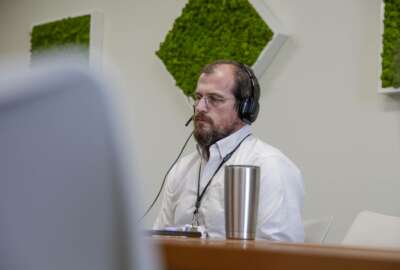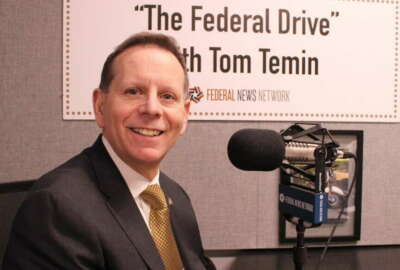
Distancing has hit women veterans particularly hard
Physical distancing has made access to health care particularly difficult for women veterans so VHA has stepped up outreach to them.
Best listening experience is on Chrome, Firefox or Safari. Subscribe to Federal Drive’s daily audio interviews on Apple Podcasts or PodcastOne.
Physical distancing and stay-at-home-orders have made access to health care particularly difficult for women veterans. The Veterans Health Administration has stepped up outreach to them, offering a range of services to ensure everything from contraception to protection from domestic abuse. For an update, Federal Drive with Tom Temin spoke to VHA’s director of comprehensive women’s health services, Dr. Sally Haskell.
Interview transcript:
Tom Temin: Dr. Haskell, good to have you on.
Dr. Sally Haskell: Well, thank you so much. I’m very pleased to be here.
Tom Temin: Give us the big picture here of how it looks as if women’s veterans health has been affected, or their access to health care has been affected by the pandemic. What’s the big picture here?
Dr. Sally Haskell: Well, I think the big picture is that in general, women veterans are affected similarly to how women are affected in the general community, which is that women may be during the pandemic more likely to have job loss related to the fact that women are overall more likely to have low paying jobs that could be lost. In addition, some women are trying to work from home and their children are at home. So, you know, we do see just greater impacts toward women in general related to those factors. And then within the VA, as we’ve seen in many healthcare systems, most of our healthcare has been pivoted toward virtual care, so telehealth or telephone. So women, of course, have left face to face access to care. And that has affected several things that we have made special efforts to try to mitigate. One is that some of women’s routine screening care such as pap smears, mammograms, things like that have had to be deferred. And so we’re making special efforts to track all of those things and to reassure women that we will get them in and get those things taken care of as soon as we are able to. Some of the other things are that specifically impact women are things like access to contraception. So we want to make sure that women have adequate supplies of their birth control pills if they’re not able to get in for a visit. And then other types of contraception such as if someone needed an IUD placed or something like that, we want to make sure that we make arrangements for that. Or if they’re using something like an injectable contraception, there’s something that some women use called depo provera that they would receive an injection every three months. And so if they can’t come in for that, we’ve had to make sure that we make arrangements for how they would get that if they’re not able to come in for a routine visit. That could be something like mailing it out or having them come for a drive thru visit. So those are some of the things that impact women uniquely is a thing as maternity care. We don’t actually provide maternity care on site at the VA, but we provide it pay for it in the community. And we have, at every facility, we have someone who’s called a maternity care coordinator, and that person helps coordinate the care between the community and the VA. And because women who are pregnant have had some of their prenatal care disrupted even in the community, we are making sure that our maternity care coordinators outreach by sending letters making phone calls just making extra contact with their pregnant women veterans during this time.
Tom Temin: Got it. And when you send people to the local care providers say for maternity care, could those local community providers also do some of the other things like give the contraceptive shots or the other measures that could not get out of VA facility?
Dr. Sally Haskell: Well, it’s really mostly pregnant women who we’re sending into the community for maternity care. So our general women who are receiving care in the VA, we would make sure that we provide everything they need even though they’re they’re having their usual visits through telehealth or telephone, we make sure that they have all the services they need available to them in the VA.
Tom Temin: And talk more about the virtual tools, telemedicine, what’s the trend there and what kinds of things can be done tele-le versus what people would have to come in or see somebody for?
Dr. Sally Haskell: Right. So, VA has pivoted many of its services, especially in the high impacted areas to telephone or telehealth modalities. And so we have something that’s called VVC, VA Video Connect, which is a sort of a FaceTime type application that providers can use to connect to their veterans. And we’re also doing many telephone visits as well. And we’ve seen over 1,000% increase in our use of these types of services during the pandemic. There’s also, we have the availability to do secure messaging through our patient portal. And so our veterans can send a secure email to their provider or to their team, their healthcare team, and, get a response directly from their provider or team through that. So there’s a lot of virtual tools available.
Tom Temin: One of the early warnings, I guess, when this whole pandemic kind of hit the nation was the potential for an increase in domestic violence as a result of people being stuck at home together, I guess, or intimate partner violence. Has that been the case for women veterans? Do you track that kind of thing? And what can be done to mitigate that potential situation?
Dr. Sally Haskell: Right. Well we do track it, but it’s really too early to know for sure. We’ve only heard some anecdotal reports thus far. So we don’t have national data yet to know if we’ve had an increase. But what we have been doing is preparing our local facilities, our staff, we do have intimate partner violence coordinators at all of our facilities. And we’ve made sure that they’re aware of this risk. And we are working hard to not only screen our women veterans, but also to provide resources to all of our our providers and staff at our facilities to be able to assist women veterans should these things occur.Tom Temin: And is there an age factor with respect to how receptive veterans are to these different services? I mean, someone who is just recently out of the military might be more comfortable using online types of tools than someone who might have mustered out 30 years ago.
Dr. Sally Haskell: Right. You know, it’s really amazing and we really have seen veterans of all ages taking up these types of technologies. But we really do have the availability to offer them either telephone or telehealth. So if anyone for any reason feels more comfortable just doing a telephone visit with their provider, they’re able to do that. But, you know, I can say personally, I still have a practice and many of my older women veterans have been perfectly willing to do the video as well. So it really has worked out great and it’s very simple to use.
Tom Temin: Sure. And if someone is not so technically savvy can under the privacy laws and what are good practices in medicine, have a third party say a daughter or a neighbor or something, help them therefore they would be present for that session. Is that kosher?
Dr. Sally Haskell: Yes, I think that is, you know, it is certainly, you are able to have a family member present as long as the veteran gives permission for that to occur.
Tom Temin: And I guess my other question is, do we know yet, is it possible to measure whether actual coronavirus infections have different macro effects on the male versus the female population?
Dr. Sally Haskell: Well, I don’t think we have any evidence right now within the VA for different effects of the virus. Certainly in the general population we’ve we’ve all heard these reports of men being more heavily impacted than women. What I can say in the VA so far is that we’ve seen about equal rates of positive infection, positive testing among men and women. I think it’s really too early to say anything about mortality rates. But so, in the VA so far, we have not seen any differences.
Tom Temin: Dr. Sally Haskell is director of Comprehensive Women’s Health Services at the Veterans Health Administration. Thanks so much for joining me.
Dr. Sally Haskell: Okay. Thank you very much. It was a pleasure to be here.
Copyright © 2025 Federal News Network. All rights reserved. This website is not intended for users located within the European Economic Area.
Tom Temin is host of the Federal Drive and has been providing insight on federal technology and management issues for more than 30 years.
Follow @tteminWFED




